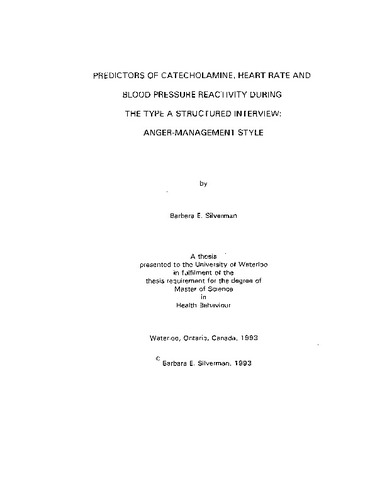| dc.description.abstract | A subset of data was used from the Waterloo Longitudinal Reactivity Study (WLRS)to examine predictors of cardiovascular reactivity during the Type A Structured Interview (SI). Sex, age, total cholesterol, body mass index (BMI), activity level, smoking, drinking, family history of cardiovascular disease, anger-management styles (i.e., hostility, SI Components, and anger) and respective resting levels for the dependent measures were the predictor variables. Systolic blood pressure (SBP), diastolic blood pressure (DBP), heart rate (HR), norepinephrine, and epinephrine were the dependent measures. For this study, 111 males and 129 females completed the study. They were first or second year students from the University of Waterloo. The subjects' mean age was 20.44 years. In the WLRS, subjects were asked to come to the laboratory on several occasions. The first occasion was to obtain consent. The second occasion was to habituate subjects to the laboratory setting and the equipment. The third session was the test proper. The focus of this secondary data analysis was to examine the predictive property of anger-management styles to reactivity during one task in the test proper, the SI. Factor analyses were done on the psychometric scales. From this, three factors emerged: hostility, SI components, and anger. These variables, along with the remaining independent variables were entered in multiple regression equations. For norepinephrine, epinephrine, and DBP reactivity only the respective resting values were predictive of reactivity. The independent measures, sex and BMI were predictive of SBP reactivity. Predictors of HR reactivity were resting HR, anger(one of the three factors), and sex. The results of this study did not support the contention that personality measures are predictive of catecholamine or blood pressure reactivity. H R reactivity, however, was predicted by personality and demographic measures. Although clinical applications are not possible, the study allows for the possibility that one day only psychometric scales will need to be completed in order to predict reactivity. | en |

